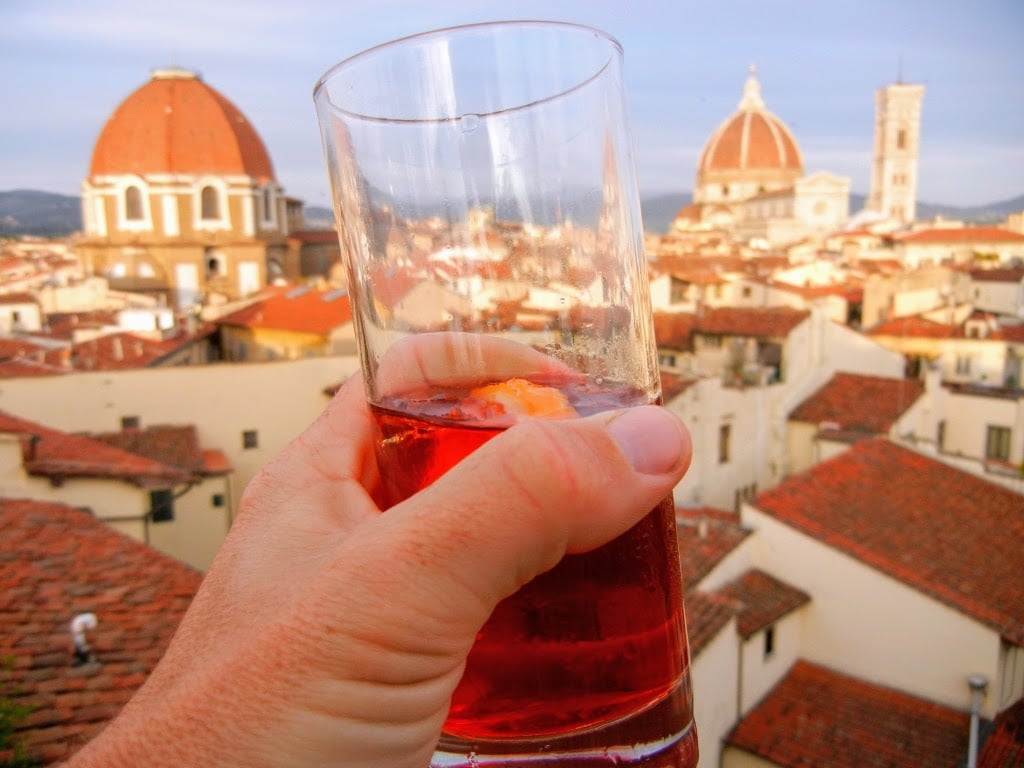Updated on November 7, 2023
The weather here in Italy is getting milder and that leads to thoughts of spring and outdoor terraces in the sun sipping, what else?… Aperol spritz, a classic Italian cocktail.
Aperol spritz is Italy’s most popular aperitif and it’s perfect for your happy hour. It’s bright, colorful, really refreshing and doesn’t contain too much alcohol.
How The Spritz Got Its Name
The original spritz wasn’t exactly like we know it today.
The idea originated in Lombardy and Venice in the late 18th-early 19th century. This part of Italy was dominated by the Austro-Hungarian empire. Austrian soldiers found the locals’ wines a bit too strong for their taste, so they began to water them down with fizzy water.
The German verb ‘spritzen’ (to splash or squirt) gave rise to the name.
Quick History of Aperol

At the start of the 20th century came a truly revolutionary device – the soda siphon. So, the watery wine became the wine and soda which is popular in many countries today. However, the spritz ‘cocktail’ as we know it was only invented in the 1920s when bartenders began to add a touch of colored bitters to their wine and soda.
Of course, there is more than one type of bitter! The town of Padua laid claim to ‘Aperol’, while the classic Venetian spritz was made with ‘Select’ (similar tasting, if a little more ‘bitter’ and bright red in color instead of orange). By the 1970s the Aperol version had become an official IBA (International Bartenders’ Association) cocktail.
The Campari Group bought Aperol in 2003, taking it out of Northern Italy and transforming it into a global brand with an aggressive marketing campaign. The bitter increased its sales by an average of over 16% each year and Aperol now makes up one-fifth of the Campari Group’s 2 billion annual sales.
There was a small plateau in the year 2020 – after all, we were all locked down in Italy and Aperol and Aperol spritz are definitely associated with conviviality, going out, and sharing fun moments with friends. But things seem to be on the upturn once more. With other international markets still to be explored this little orange bottle seems unstoppable.
What Kind Of Alcohol Is Aperol?
Aperol has been poetically described as ‘an Italian sunset in a glass’ and its warm orange color is definitely evocative.
The recipe is, of course, secret but it does include bitter and sweet oranges, as well as rhubarb! It was developed by brothers Luigi and Silvio Barbieri, who inherited their father’s alcohol-producing company in 1912. The name Aperol is meant to echo the French “Apéro”, or aperitif.
Alcohol content – Aperol contains only 11% alcohol by volume (less than most wines), so it’s not overly alcoholic.
What Does Aperol Spritz Taste Like?

Aperol spritz is refreshing and sometimes it goes down a little too easily. It’s a combination of bitter and sweet, with a citrusy taste. Orange notes certainly predominate but there are also hints of rhubarb, gentian root, herbs, and even vanilla.
How To Serve Aperol Spritz
Serve in:
- A large wine glass (you can use a white wine glass but we love using a round red wine glass)
- An old-fashioned cocktail tumbler
No matter which glass you choose, there’s usually plenty of ice (the bar owner’s moneymaker!) but lots of ice creates an even more refreshing summery drink.
An orange slice is often added but you may find an olive instead (in a slight nod to Venetian customs).
When To Drink An Aperol Spritz

The classic moment to drink an Aperol spritz is as its name suggests – at aperitif time. Around 6.30-7.30 pm is peak Aperol time.
It’s usually accompanied by bar snacks (complimentary of course) and is a great drink to enjoy with friends.
It’s meant to whet your appetite for dinner and give you a little lightly-alcoholic boost – not to get you drunk!
Want to know more about aperitivo?
Read our post on Aperitivo – All You Need to Know About Italian Aperitif
Of course, it’s great for any occasion – on holiday, when relaxing by the pool, before lunch or at brunch, or to ring in the New Year.
While it’s not a typical after-dinner cocktail no one is going to think it strange if you order one.
Sipping an Aperol spritz is a perfect way to enjoy a lighter drink at any time of day.
Aperol Spritz in Italy
Aperol has primarily been marketed to the 20s-30s age group and has a young, fun image based around socializing in groups, but Italians of all ages enjoy Aperol spritz!
Where it was once only known in the North-East of Italy, it’s now spread to the whole country (and around the world!)
Aperol Spritz Substitutions

Of course, there are lots of things you can enjoy in your spritz apart from Aperol. Here are a few spritz variations:
- Campari spritz – dark red in color, with a stronger bitter taste and definitely more alcohol (between 20.5 and 28.5% depending on the country it’s sold in).
- Select spritz – the Venetian original. Bright red and a little more bitter than Aperol, but still with hints of orange.
- Cynar spritz – this is a famous Italian bitter with a very unusual ingredient – artichoke. It has hints of caramel, toffee, and bitter herbs.
- Hugo spritz – something completely different. Hugo is a really refreshing elderflower-based liqueur, with even lower alcohol than Aperol.
- China Martini spritz – one for connoisseurs. This tastes of bitter orange, with woody, balsamic notes. It’s very sweet, dark and rich. It’s sometimes known as a ‘winter spritz.’
- Vermouth spritz – While Vermouth is often enjoyed as an aperitif with ice only (or ice and a little splash of soda) any type of Vermouth can work in a recipe with prosecco, for example, Martini Rosso (red Martini) or Martini Bianco (white Martini).
How To Make Large Batches of Aperol Spritz
There’s no easy way to do this as a Spritz has to fizz! Pre-mixing it at home in large batches and letting it sit around is not a good idea.
If you’re having a party get the soda siphon out and start spritzing!
The prosecco should also be a newly opened (or properly sealed) bottle too. You want it to be as sparkling as possible.
To help you out Aperol has begun selling pre-mixed spritz in individual bottles but if you mix it yourself you can adjust the proportions to suit your own tastes.
How To Make A Non-Alcoholic Aperol Spritz

If you want a light, thirst-quenching drink without alcohol (and you still want to fit in with the ‘orange crowd’) try 2 parts orange juice, or any other tropical fruit juice mix with one part non-alcoholic bitter (they do exist!) and one part soda.
One of Italy’s favorite non-alcoholic aperitifs, which resembles a spritz, is Crodino (yes, it’s also orange).
There’s also a big market for non-alcoholic aperitifs in other countries. The Lyre’s brand, which sells all over the world, including in the U.S., make a ‘non-alcoholic Aperol’ and there’s even a pre-mixed version in a can called ‘Amalfi Spritz’ which is impressive.
An Italian’s Tips For Making Aperol Spritz
Use Prosecco
The perfect wine for an Aperol spritz is prosecco. Aperol is already sweet, so it’s best paired with a drier prosecco.
An ‘extra-dry’ (around 0.4-0.6 ounces of sugar per liter) or ‘brut’ (even drier at under 0.4 ounces of sugar per liter) prosecco is fine. A prosecco marked ‘dry’ (which is confusingly sweeter, with between 0.6 – 1.1 ounces of sugar per liter) is probably not the best choice.
Don’t Bother With Metodo Classico
There’s no need to use Italian sparkling wines that are labelled ‘metodo classico’. These are sparkling wines produced in champagne-style that are best enjoyed on their own. They are obviously higher in price and it’s just a waste to use them in a Spritz!
Remember 3-2-1
For easy spritz-making just remember “3-2-1”: 3 parts chilled prosecco, 2 parts Aperol and 1 part soda. Obviously, this can be adjusted according to taste. Whisper it…some of us don’t bother to add the soda at all.
Stick To Classic Soda Water or Seltzer
Spritz is traditionally served with soda water or seltzer, but in a pinch, you can add tonic water or club soda. At home we use a sparkling water like San Pellegrino.
If You Like Aperol Spritz You May Also Like
- Campari spritz – a more alcoholic, more bitter, ‘grown up’ spritz.
- Campari orange or Campari grapefruit – if you like the citrus taste you may enjoy these aperitif combinations too.
- Americano – again, we’re getting into more alcoholic cocktail territory. An Americano has Campari, red Vermouth and Soda. It has a slightly orangey taste.
- Negroni sbagliato – another great aperitif cocktail with Campari, red Vermouth and Prosecco.
- Mimosa – for citrus lovers the Mimosa is light and refreshing, with orange juice and sparkling wine (which can be prosecco, metodo classico or champagne!) The famous Bellini is a similar aperitif, but with white peach and the Rossini has strawberry puree.
Recipe For Aperol Spritz
Aperol Spritz – An Italian’s Guide

The simple recipe for Italy's classic aperitivo cocktail.
Ingredients
- 3 parts chilled prosecco
- 2 parts Aperol
- 1 part soda water
Instructions
Fill a wine glass or an ‘old-fashioned’ cocktail tumbler with ice.
Pour in your prosecco, add the Aperol and, finally, top with the soda water.
Garnish with an orange slice.
Notes
The Official IBA (International Bartenders Association) Spritz Recipe calls for the following measurements:
6 cl of prosecco
4 cl of Aperol
A squirt of soda or seltzer
Nutrition Information:
Amount Per Serving: Calories: 0Total Fat: 0gSaturated Fat: 0gTrans Fat: 0gUnsaturated Fat: 0gCholesterol: 0mgSodium: 0mgCarbohydrates: 0gFiber: 0gSugar: 0gProtein: 0g
Enjoy your Aperol Spritz – Salute (cheers)!
Aperol Spritz FAQ
In the classic Aperol spritz recipe, Aperol is usually mixed with prosecco (Italian sparkling wine) and a dash of soda to make an Aperol spritz.
You can drink Aperol straight, with a twist of orange and ice, but it’s far more common as an addition to a spritz. Again, it’s just a question of taste.
Aperol is an orange-red bitter liqueur with a bitter and sweet orange base.
Aperol is alcoholic, but not particularly high in alcohol. It is 11% ABV (for comparison, most ‘medium alcohol’ wines are around 10.5-11% ABV).
If you’d like to make your own Aperol spritz, you can buy Aperol in most stores that carry liquor. Otherwise, you’ll find them on the drinks menu at many bars and Italian restaurants.




